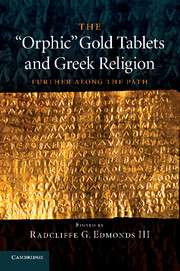Book contents
- Frontmatter
- Contents
- List of contributors
- Acknowledgements
- Note on abberivations
- PART I THE TABLET TEXTS
- PART II TEXTS AND CONTEXTS
- 3 Text and ritual
- 4 Are the “Orphic” gold leaves Orphic?
- 5 “A child of Earth am I and of starry Heaven”
- 6 Common motifs in the “Orphic” B tablets and Egyptian funerary texts
- 7 Center, periphery, or peripheral center
- PART III SEMIOTIC AND NARRATIVE ANALYSES
- Compiled Bibliography
- Index
- Index locorum
- References
3 - Text and ritual
The Corpus Eschatologicum of the Orphics
Published online by Cambridge University Press: 04 February 2011
- Frontmatter
- Contents
- List of contributors
- Acknowledgements
- Note on abberivations
- PART I THE TABLET TEXTS
- PART II TEXTS AND CONTEXTS
- 3 Text and ritual
- 4 Are the “Orphic” gold leaves Orphic?
- 5 “A child of Earth am I and of starry Heaven”
- 6 Common motifs in the “Orphic” B tablets and Egyptian funerary texts
- 7 Center, periphery, or peripheral center
- PART III SEMIOTIC AND NARRATIVE ANALYSES
- Compiled Bibliography
- Index
- Index locorum
- References
Summary
INTRODUCTION
The books ascribed to Orpheus must have been legion already in the fifth century. The Euripidean Hippolytus, whom his father regards as a vegetarian and an ecstatic, is said to have Orpheus as a Lord, “to rave and to follow the smoke of many writings”; and Plato knows religious specialists who made use of “a hubbub of books by Orpheus and Musaeus.” Much later, in the prologue of his own Argonautika, Orpheus gives an impressive list of what he is about to sing – a theogony, starting from Chaos, Nyx, and Phanes, followed by the narrations about Demeter and Persephone, her relationship to Zeus and her μέγα πένθος, about the myths and the cults of Cybele, the Corybants and the Cabiri, of Praxidice, Aphrodite and Adonis, Isis and Osiris, and the oracles of Nyx about Bacchus, but also about divination through dreams and signs, purification, “supplications of gods and gifts to the dead”; finally a report of what he himself had seen in his travels, his descent into Hades and his visit to Egyptian Memphis, which must mean eschatology on the one hand, magic or theurgy on the other. This sounds impressive, and in some respects enigmatic – and that is just Orpheus' intention: all these, he says, are “frightful songs for mortal men, secrets without fear only to the initiates”: Orpheus is the Great Initiator.
- Type
- Chapter
- Information
- The 'Orphic' Gold Tablets and Greek ReligionFurther along the Path, pp. 53 - 67Publisher: Cambridge University PressPrint publication year: 2011
References
- 18
- Cited by



